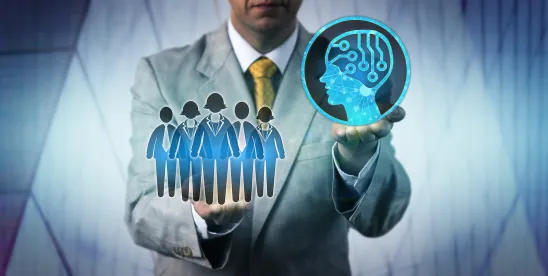On Aug. 9, 2024, Illinois Gov. Pritzker signed into law HB3733, which amends the Illinois Human Rights Act (IHRA) to cover employer use of artificial intelligence (AI). Effective Jan. 1, 2026, the amendments will add to existing requirements for employers that use AI to analyze video interviews of applicants for positions in Illinois.
Illinois is the latest jurisdiction to pass legislation aimed at preventing discrimination caused by AI tools that aid in making employment decisions. The state joins jurisdictions such as Colorado and New York City in regulating the use of AI in this context.
Restrictions on the Use of AI in Employment Decisions
The amendments expressly prohibit the use of AI in a manner that results in illegal discrimination in employment decisions and employee recruitment. Specifically, covered employers are barred from using AI in a way that has the effect of subjecting employees to discrimination on the basis of any class protected by the IHRA, including if zip codes are used as a proxy for such protected classes.
These new requirements will apply to any employer with one or more employees in Illinois during 20 or more calendar weeks within the calendar year of, or preceding, the alleged violation. They also apply to any employer with one or more employees when unlawful discrimination based on physical or mental disability unrelated to ability, pregnancy, or sexual harassment is alleged.
The amendments define AI as a “machine-based system that, for explicit or implicit objectives, infers, from the input it receives, how to generate outputs such as predictions, content, recommendations, or decisions that can influence physical or virtual environments.” AI also includes “generative artificial intelligence.”
The amendments further define generative AI as “an automated computing system that, when prompted with human prompts, descriptions, or queries, can produce outputs that simulate human-produced content, including, but not limited to”:
- Textual outputs, such as short answers, essays, poetry, or longer compositions or answers;
- Image outputs, such as fine art, photographs, conceptual art, diagrams, and other images;
- Multimedia outputs, such as audio or video in the form of compositions, songs, or short-form or long-form audio or video; and
- Other content that would be otherwise produced by human means.
Employer Notice Requirements
The amendments require a covered employer to provide notice to employees if the organization uses AI for the following employment-related purposes:
- Recruitment
- Hiring
- Promotion
- Renewal of employment
- Selection for training or apprenticeship
- Discharge
- Discipline
- Tenure
- The terms, privileges, or conditions of employment
While the amendments do not provide specific direction regarding the notice, such as when and how the notice should be provided, they direct the Illinois Department of Labor to adopt rules necessary to implement the notice requirement. Thus, additional guidance should be forthcoming.
Although not required, Illinois employers and AI technology developers may wish to consider conducting audits or taking other measures to help avoid biased outcomes and to further protect against liability.
Enforcement
The IHRA establishes a two-part enforcement procedure. The Illinois Department of Human Rights (IDHR) is the administrative agency that investigates charges of discrimination, while the Illinois Human Rights Commission (IHRC) is an administrative court that adjudicates complaints of unlawful discrimination. Complainants have the option to proceed before the IHRC or file a civil action directly in circuit court after exhausting their administrative remedies before the IDHR.
Practical Considerations
Before the effective date, covered employers should consider:
- Assessing which platforms and tools in use (or under consideration) incorporate AI, including generative AI, components.
- Drafting employee notices and developing a plan for notifying employees.
- Training AI users and quality control reviewers/auditors on anti-discrimination/anti-bias laws and policies that will impact their interaction with the tool(s).
- Partnering with legal counsel and experienced vendors to identify or create privileged processes to evaluate, mitigate, and monitor potential discriminatory or biased impacts of AI use.
- Reviewing any rules published by the Illinois Department of Labor, including on the circumstances and conditions that require notice and the timeframe and means for providing notice.
- Multi-state employers should continue to monitor for additional requirements. For instance, California’s legislature is considering a range of AI-related bills, including some aimed at workplace discrimination.




 />i
/>i

